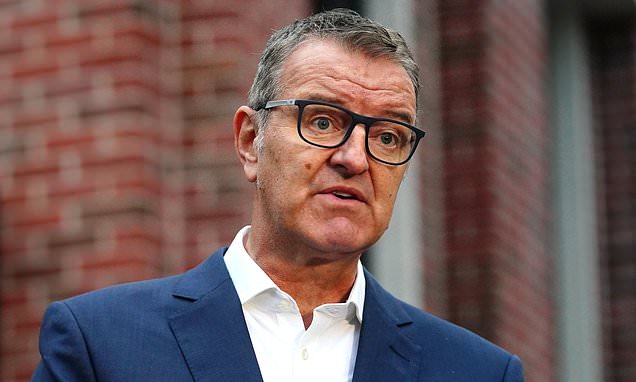ECB chairman Richard Thompson offers apology as report lays bare cricket’s racist culture, with over half of the 4,000 people surveyed saying they have experienced discrimination
- The report also found that women had also been neglected in the game
- The ECB have made 44 recommendations for change following the publication
- Chairman Richard Thompson said ‘it has not been the case’ that cricket is for all
The ECB have issued an unreserved apology to ‘anyone who has ever been excluded from cricket’ after an independent report concluded that racism and sexism are entrenched in the sport.
As Mail Sport reported last week, the Independent Commission for Equity in Cricket (ICEC) published today paints a damning picture of cricket in this country, with more than half of the 4,000 people surveyed saying they have experienced discrimination. This shocking figure rises to an extraordinary 75 per cent, 82 per cent and 87 per cent respectively for respondents of black, Indian and Pakistani/Bangladeshi origin.
The ICEC have made 44 recommendations for change, including introducing equal pay for men and women’s England players and the creation of a new regulator sitting outside the ECB, similar to the independent football regulator which is being introduced by the Government. The ECB will respond by creating a sub-committee of their board to consider the commission’s findings, with a view to reporting within the next three months, but began by making an apology.
‘On behalf of the ECB and wider leadership of the game, I apologise unreservedly to anyone who has ever been excluded from cricket or made to feel like they don’t belong,’ said chairman Richard Thompson. ‘Cricket should be a game for everyone, and we know this has not always been the case.
‘Powerful conclusions within the report also highlight that for too long women and black people were neglected. We are truly sorry for this.
ECB chairman Richard Thompson has issued an apology after an independent report concluded that racism and sexism are entrenched in the sport
The findings were on the back of accusations made by former Yorkshire player Azeem Rafiq
‘This report makes clear that historic structures and systems have failed to prevent discrimination, and highlights the pain and exclusion this has caused. I am determined that this wake-up call for cricket in England and Wales should not be wasted. We will use this moment to demonstrate that it is a game for all and we have a duty to put this right for current and future generations.’
In addition to widespread racism, the commission found sexism was endemic throughout cricket, as well as concluding that the sport was not inclusive to the 93 per cent of the country’s children who attend state schools. The procedures in place for reporting incidents of racism were also strongly criticised as confusing, overly defensive and not fit for purpose.
‘Racism, class-based discrimination, elitism and sexism are widespread and deep-rooted,’ said the commission’s chair, Cindy Butts. ‘The game must face up to the fact that it’s not banter or just a few bad apples. Discrimination is both overt and baked into the structures and processes within cricket.
The damning revelations come days before the second Ashes Test gets underway at Lord’s
‘The stark reality is cricket is not a game for everyone. While there has been commendable and significant progress in the women’s game, women continue to be treated as second-class citizens with unequal access, pay and treatment. The England women’s team are yet to play a Test match at Lord’s, the home of cricket!’
The ECB were, however, praised for inviting such scrutiny by commissioning the report two-and-a-half years ago in the light of the issues thrown up by the Black Lives Matter movement.
ECB chief executive Richard Gould conceded that the sport would face an existential crisis if issues highlighted by the commission were not addressed promptly.
‘We’re disappointed but not shocked,’ Gould said. ‘We’re impatient for change. It is an existential issue for the sport and we understand the seriousness of the issues. We’re determined to make cricket the most inclusive sport in the country.’
Source: Read Full Article



